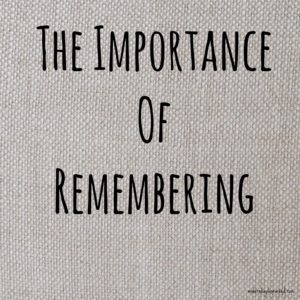Preaching At The New Year
Preaching At The New Year
It’s time we turn from preaching during Advent, the subject of the last two posts, and turn to preaching at the new year. Today’s post reflects on some things you might use when preaching at the new year in your church.
The other night I was watching Jeopardy, the trivia game show, and I was amazed at the person who was the champion for several days. His memory was amazing! At one point, when a particularly small detail was quickly remembered, my wife and I looked at each other and asked, “How does he do that?” How does anyone remember those little facts? I wished I could have that kind of memory.

Jill Price
A short time later, however, I read about Jill Price. Jill has a rare condition, called hyperthymesia, which makes her remember everything. She can recall every memory in vivid detail, everything that ever happened to her. Experts at the University of California studied her for six years, trying to determine what makes her memory so powerful, but came to no conclusion on how to duplicate her ability.
Preaching Remembering At the New Year
Wouldn’t you want to remember everything? Maybe not. Jill says that there is a dark side to her ability. She remembers every bad decision and its consequences, every insult, and everything that was embarrassing. She indicated that the memories have paralyzed and eaten her up.
I share this with you because preaching at the new year usually involves two parts: remembering the past year,  and looking ahead to the new. So what should you remember? Out of all the things that happened in 2020, which should you recall?
and looking ahead to the new. So what should you remember? Out of all the things that happened in 2020, which should you recall?
In the book of Deuteronomy Moses gives some final guidance to the Israelites before he dies. He encourages people to look back, to remember some important things. This is what he says,
Remember how the Lord your God led you all the way in the wilderness these forty years, to humble and test you in order to know what was in your heart, whether or not you would keep his commands. He humbled you, causing you to hunger, and then feeding you with manna…to teach you that man does not live on bread alone, but on every word that comes from the mouth of the Lord. (Deuteronomy 8:2-4)
So we are to remember all the way God led, and we are to remember the good and the bad during that time, because God leads us in both. When you are preaching at the New Year remind them to look back at the challenging times, not so that they feel badly, but so that they can see how God led them to trust Him during that time.
The Emperor Moth

Emperor Moth
I read this past week of a man who found a cocoon and took it home to watch what came out. The day came for the appearance. A small opening appeared, and the man watched as the moth struggled for a long time, several hours, to squeeze its body through the little hole. Finally, it seemed to make little progress, and the man assumed that it had become stuck. So, he helped. He took a pair of scissors and snipped off a part of the cocoon to free the moth. Soon the moth emerged, but he had a swollen body, and shriveled wings. The man expected the body to shrink and the wings to expand, but neither happened. The little moth spent its short life crawling around, and it never flew.
What happened? It turned out that the moth needed to struggle to force the fluid from the body into the wings. By limiting the struggle, the man short-circuited God’s design.
God’s Design
God has made us the same way. The struggles increase our strength. James put this principle well in the first chapter of his letter:
Consider it pure joy, my brothers and sisters, whenever you face trials of many kinds, because you know that the testing of your faith produces perseverance. Let perseverance finish its work so that you may be mature and complete, no lacking anything. (James 1:4)
New Years Preaching
Remind your people of this when you are preaching at the new year in your church. Remind them that God has been faithful in every situation in the past year. In the next post we’ll look at the other part of preaching at the new year: looking ahead.
For further reflection, here is Stephen Furtyk reflecting on remembering the right things.



